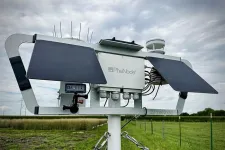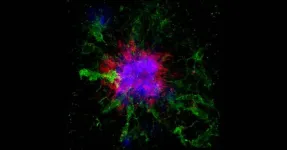(Press-News.org) ST. LOUIS, MO, August 21, 2023 – Agrela Ecosystems, a startup launched by Nadia Shakoor, PhD, principal investigator, at the Donald Danforth Plant Science Center announced the pilot launch of its flagship product, PheNodeTM. This milestone marks the first step towards a full-scale commercial release set for 2025. PheNode is an advanced, scalable environmental sensor platform designed to empower users with customizable data collection and the rapid integration of new technologies. Already creating a buzz, the platform is now collecting data and generating customer feedback, preparing to revolutionize the field with its optimized, modular sensor technology.
In aligning with the principles of Industry 4.0, often referred to as the fourth industrial revolution characterized by smart systems and digitization, PheNode incorporates cutting-edge technology to redefine data collection standards, opening endless opportunities for advancement in various sectors.
PheNode has already gathered an impressive range of customers, from the Taylor Geospatial Institute at Saint Louis University to the globally respected Salk Institute's Harnessing Plants Initiative in San Diego, CA. Back at home, the Danforth Center is deploying PheNode technology within its own realm, collecting vital data from its Creve Coeur campus and St. Charles-based field research site. The momentum doesn't stop there; PheNode is also set to play a pivotal role in community projects. In collaboration with the Jackie Joyner-Kersee Food, Agriculture, and Nutrition Innovation Center and the University of Illinois Extension, PheNode will be an integral part of the USDA NIFA-funded FANE Summer Camp initiative. This groundbreaking project seeks to ignite the passion of young minds towards food and agricultural technologies, underlining the transformative impact these advancements can have on our world.
Despite being in its nascent pilot phase, Agrela has already recorded an impressive $250,000 in revenue through the sales of its game changing PheNode technology and related services. This initial traction reinforces the belief that they could be addressing a long-standing gap in the market. Agrela Ecosystems' founders envision a shift from traditional 'closed' sensor platforms to a more inclusive 'open platform'. This open approach will enable the swift integration of emerging technologies across various climate-smart industries, such as real-time carbon measurements and advanced crop modeling.
"Securing key partnerships with early adopters is fundamental to our journey, providing an essential feedback loop that drives us to fine-tune our dynamic data collection solutions. Our mission is to continuously adapt to our users' requirements while upholding our commitment to data accuracy and transparency," Shakoor asserts.
Agrela Ecosystems' initial seed funding was successfully garnered from BioGenerator and the Danforth Technology Company. Agrela's President, Bill Kezele, celebrates this achievement, remarking, “The Danforth Technology Company and BioGenerator recognized the potential of
PheNode, which served as a stepping stone to our early success. This support enables us to publicly share our efforts with those who can benefit now as we continue enhancing the system and expanding into new markets.”
"Agrela firmly believes in the importance of accurate, research-grade data, and is committed to offering quality products and services. Our aim is to embolden users, channeling PheNode’s environmental data into their chosen platforms for analysis and visualization. In doing so, we are enabling them to create tailor-made data collection tools that better align with their unique requirements," elaborates Shakoor.
While originally designed to address quantitative gaps in remote field phenotyping, it has been discovered that PheNode effectively meets the growing demand for scalable, customizable data capture across a broad spectrum of industries, far beyond its initial agricultural roots. These industries include established sectors as well as rapidly emerging fields such as the geospatial industry, sustainability initiatives, and smart infrastructure. With its unique adaptability, PheNode stands ready to fulfill the diverse data-collection demands of these varied industries and drive meaningful, transformative advancements.
About Agrela Ecosystems
Founded in 2016 by plant scientists at the Danforth Plant Science Center in St Louis, MO, Agrela aims to improve data collection across multiple industries with the launch of its flagship product, PheNode. With PheNode, Agrela is transcending the constraints of current remote sensing solutions to offer a versatile, scalable, open sensor platform that fosters innovation and encourages the rapid integration of emerging technologies. Discover more at agrelaeco.com.
About the Donald Danforth Plant Science Center
Founded in 1998, the Donald Danforth Plant Science Center is a not-for-profit research institute with a mission to improve the human condition through plant science. Research, education, and outreach aim to have impact at the nexus of food security and the environment and position the St. Louis region as a world center for plant science. The Center’s work is funded through competitive grants from many sources, including the National Science Foundation, National Institutes of Health, U.S. Department of Energy, U.S. Agency for International Development, the Bill & Melinda Gates Foundation and through the generosity of individual, corporate and foundation donors. Follow us on Twitter at @DanforthCenter.
Contact: Karla Roeber, Vice President Public and Government Affairs, kroeber@danforthcenter.org
END
Agrela Ecosystems ignites innovation in data-driven agriculture
Startup launches the next-generation environmental sensor platform
2023-08-21
ELSE PRESS RELEASES FROM THIS DATE:
PS gene-editing shown to restore neural connections lost in brain disorder
2023-08-21
MINNEAPOLIS/ST. PAUL (08/21/2023) — A new study from the University of Minnesota is the first to demonstrate the ability for gene therapy to repair neural connections for those with the rare genetic brain disorder known as Hurler syndrome. The findings suggest the use of gene therapies — an entirely new standard for treatment — for those with brain disorders like Hurler syndrome, which have a devastating impact on those affected.
The study was published in the Nature journal Scientific Reports.
Hurler syndrome, also known as mucopolysaccharidosis type I (MPS I), is a genetic disorder affecting newborns ...
Argonne receives funding to use AI and machine learning for nuclear physics research
2023-08-21
The U.S. Department of Energy (DOE) announced $16 million for 15 projects that will implement artificial intelligence (AI) methods to accelerate scientific discovery in nuclear physics research. DOE’s Argonne National Laboratory will lead two of those projects and be a collaborator on another.
These projects will use AI and Machine Learning (ML) tools and methods for nuclear physics experiments, simulation, theory and accelerator operation to expand and accelerate scientific reach.
“Artificial intelligence has the potential to shorten the timeline ...
Bloom studying impact of exposure to perfluoroalkyl substances on weight loss
2023-08-21
Michael Bloom, Associate Professor, Global and Community Health, received $158,900 from the National Institutes of Health for the project: "Impact of Exposure to Perfluoroalkyl Substances on Weight Loss: A Pilot Study of Hispanic Children with Overweight/Obesity Participating in a Community-based Weight Loss Intervention Program."
In this pilot study, Bloom is evaluating associations between exposures to perfluoroalkyl substances (PFAS) and weight lost during a 10-week weight loss intervention among Hispanic children with overweight and obesity. He and his collaborators will quantify the association between 12 different PFAS ...
Schintler & collaborators to study perceptions of efficiency & bias in algorithmic versus human peer review
2023-08-21
Laurie Schintler, Associate Professor, Schar School of Policy and Government, is set to receive funding for the project: "Perceptions of Efficiency and Bias in Peer Review: Algorithmic versus Human Decision Making."
This project is a collaboration between the Schar School of Policy and Government (GMU) and the Department of Sociology and Anthropology (CHSS-GMU). The investigators on the team include:
PI Laurie A. Schintler;
Co-PI Connie L. McNeely, Professor, Schar School of Policy and ...
McDonald to investigate privacy ecosystems among vulnerable populations
2023-08-21
Nora McDonald, Assistant Professor, Information Sciences and Technology, is set to receive funding from the National Science Foundation for the project: "Collaborative Research: SaTC: CORE: Medium: Beyond App-centric Privacy: Investigating Privacy Ecosystems among Vulnerable Populations."
Prior research shows that people who have privacy concerns may be reluctant to access medical services. This is especially true for vulnerable populations, such as those who because of their gender, race, ethnicity, socio-economic status, or other marginalizations are more susceptible to privacy risk. These risks go beyond individual apps ...
Acosta & Burls using weather model & geologic data to test tectonic mechanisms in intercontinental setting
2023-08-21
Paul Acosta, Postdoctoral Scholar, Atmospheric, Oceanic and Earth Sciences (AOES), and Natalie Burls, Associate Professor, AOES; Graduate Program Director, Climate Dynamics, received funding from the National Science Foundation for the project: "Collaborative Research: Using a weather model and geologic data to test tectonic mechanisms in an intercontinental setting: The Altai Mountains of Central Asia."
This project seeks to apply new advances in atmospheric and geosciences to ...
Ye receives National Science Foundation CAREER Award
2023-08-21
Jinwei Ye, Assistant Professor, Computer Science, received funding for the project: "CAREER: Towards Polarimetric Visual Understanding."
In this project, Ye will study how the way surfaces reflect polarized light can be used to help recognize objects more effectively.
Ye will address the following two questions: (1) How does the polarization of light change after interacting with various types of surfaces? (2) What can polarized light tell us about the kinds of objects that it has interacted with?
Addressing these questions can lead to significant improvements in machine vision systems by strengthening their capability to do geometric ...
Intermittent fasting improves Alzheimer’s pathology
2023-08-21
One of the hallmarks of Alzheimer’s disease is disruption to the body’s circadian rhythm, the internal biological clock that regulates many of our physiological processes. Nearly 80% of people with Alzheimer’s experience these issues, including difficulty sleeping and worsening cognitive function at night. However, there are no existing treatments for Alzheimer’s that target this aspect of the disease.
A new study from researchers at University of California San Diego School ...
New “bandit” algorithm uses light for better bets
2023-08-21
How does a gambler maximize winnings from a row of slot machines? This is the inspiration for the "multi-armed bandit problem," a common task in reinforcement learning in which "agents" make choices to earn rewards. Recently, an international research team led by Hiroaki Shinkawa at the University of Tokyo developed an extended photonic reinforcement learning scheme that moves from the static bandit problem towards a more challenging dynamic environment. This study was published July 25 in Intelligent Computing, a Science Partner Journal.
The success of ...
For men with erectile dysfunction, penile implants are usually covered by insurance – but not always
2023-08-21
August 21, 2022 – Implantable penile prostheses (IPPs) are an established treatment option for erectile dysfunction (ED), and are covered by insurance in about 80% of cases, reports a paper in the September issue of Urology Practice®, an Official Journal of the American Urological Association (AUA). The journal is published in the Lippincott portfolio by Wolters Kluwer.
However, some employer-sponsored insurance plans specifically exclude this guideline-recommended treatment option for ED, according to the new research by Dr. Mohit Khera, MD, MBA, MPH, of Baylor College ...
LAST 30 PRESS RELEASES:
Alkali cation effects in electrochemical carbon dioxide reduction
Test platforms for charging wireless cars now fit on a bench
$3 million NIH grant funds national study of Medicare Advantage’s benefit expansion into social supports
Amplified Sciences achieves CAP accreditation for cutting-edge diagnostic lab
Fred Hutch announces 12 recipients of the annual Harold M. Weintraub Graduate Student Award
Native forest litter helps rebuild soil life in post-mining landscapes
Mountain soils in arid regions may emit more greenhouse gas as climate shifts, new study finds
Pairing biochar with other soil amendments could unlock stronger gains in soil health
Why do we get a skip in our step when we’re happy? Thank dopamine
UC Irvine scientists uncover cellular mechanism behind muscle repair
Platform to map living brain noninvasively takes next big step
Stress-testing the Cascadia Subduction Zone reveals variability that could impact how earthquakes spread
We may be underestimating the true carbon cost of northern wildfires
Blood test predicts which bladder cancer patients may safely skip surgery
Kennesaw State's Vijay Anand honored as National Academy of Inventors Senior Member
Recovery from whaling reveals the role of age in Humpback reproduction
Can the canny tick help prevent disease like MS and cancer?
Newcomer children show lower rates of emergency department use for non‑urgent conditions, study finds
Cognitive and neuropsychiatric function in former American football players
From trash to climate tech: rubber gloves find new life as carbon capturers materials
A step towards needed treatments for hantaviruses in new molecular map
Boys are more motivated, while girls are more compassionate?
Study identifies opposing roles for IL6 and IL6R in long-term mortality
AI accurately spots medical disorder from privacy-conscious hand images
Transient Pauli blocking for broadband ultrafast optical switching
Political polarization can spur CO2 emissions, stymie climate action
Researchers develop new strategy for improving inverted perovskite solar cells
Yes! The role of YAP and CTGF as potential therapeutic targets for preventing severe liver disease
Pancreatic cancer may begin hiding from the immune system earlier than we thought
Robotic wing inspired by nature delivers leap in underwater stability
[Press-News.org] Agrela Ecosystems ignites innovation in data-driven agricultureStartup launches the next-generation environmental sensor platform



